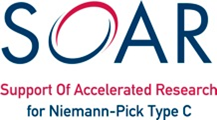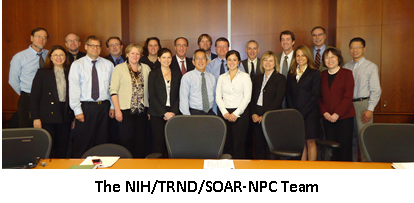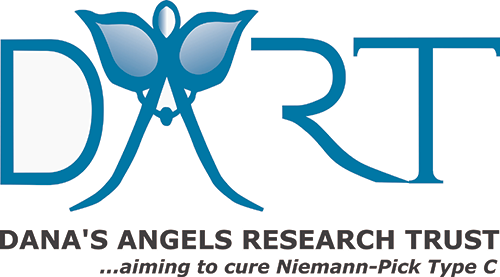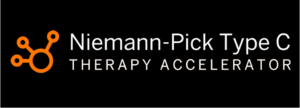

See the latest SOAR-NPC news!
DART is taking the lead in committing to a unique therapy development approach for additional NPC treatments called SOAR, Support Of Accelerated Research. Working with other NPC families and organizations, SOAR has created a multidimensional collaborative drug development program searching for an effective cocktail treatment for NPC. The ambitious, original goal was to have at least one new NPC therapy ready for clinical trial in 2013. With the start of the FDA approved Phase 1 clinical trial of VTS-270 (a proprietary form of 2-hydroxypropyl-ß-cyclodextrin), now Adrabetadex, at the National Institutes of Health in January of 2013, and more hopeful therapies in our pipeline, our goal of a “drug cocktail” are starting to take shape.
See the latest Accelerator news!
DART is also one of the founding members of the NPC Therapy Accelerator Initiative.
The NPC Community is experiencing unprecedented investment and progress in developing treatments for the disease. Today, a number of companies have NPC programs underway (see the listing on the NPC Therapy Accelerator site), two of which are in later stages of regulatory review with the FDA. Additionally, there are a number of preclinical programs being funded and supported by NPC organizations, government grants, or investors. There are also a number of collaborative research programs established to tackle key aspects of the disease that are being managed by various organizations and research groups. Phil Marella of DART is a member of the Accelerator’s steering committee.
The goals of the Accelerator are to:
- Provide easily accessible information from all companies willing to share their NPC therapy pipeline;
- Inform companies on how to engage with the committee, and the benefits of working with the Accelerator as a resource to help them connect with NPC researchers, clinicians, tools, data, mentors, and even potential investors;
- Compile all major NPC publications that physicians and scientists use to advance their research program and launch a clinical trial;
- Provide shared space for all NPC initiatives and data, and ultimately bring this information together in a shared data platform;
- Provide relevant updates for research funding opportunities; and
- Develop NPC patient and caregiver treatment preferences for the FDA and drug companies.
Currently Funded Research
Dr. Antony Cougnoux Rejoins NPC team at NIH
SOAR-NPC members, DART and Hide and Seek Foundation are funding experienced NPC researcher Dr. Antony Cougnoux to work in the lab of Dr. Forbes “Denny” Porter at the National Institutes of Health. Dr. Cougnoux’s research projects at the NIH are, (1) expanding our knowledge beyond the limited areas of the brain typically studied in NPC mice, (2) the construction of a reference source to measure changes and treatment effectiveness across different organs in NPC mice, particularly the brain, kidneys, liver, lung, heart and spleen, (3) conducting a study to evaluate the often, wide differences between patient cells and between patients who have the same mutations but demonstrate differences in clinical disease, and (4) working to improve the efficacy of gene therapy efforts by hopefully using less virus to achieve the same results and delivering higher levels of the gene brought in by the virus.
Dr. Marina Kolocha
SOAR-NPC members, DART and Hide and Seek Foundation have added Dr. Marina Kolocha to the SOAR-NPC team. Dr. Kolocha was highly recommended to us by the Muscular Dystrophy Association to assist SOAR-NPC, and we hope more broadly our NPC community, accelerate our drug development and approval process. Dr. Kolocha has been involved in the successful approval of over 200 drugs, including drugs for rare and ultra-rare diseases. Her initial projects include (1) developing a research plan for the SOAR-NPC collaborating scientists, (2) working with NPC clinicians to develop the first comprehensive NPC guidance for industry which will be submitted to the FDA, (3) coordinating the regulatory needs for the development of clinical trials for NPC with both gene therapy and new potential drug targets identified by our SOAR-NPC collaborating scientists, and (4) helping navigate the regulatory process for the approval of biomarkers for NPC.
Gene Therapy for NPC
After years of pre-clinical research, the labs of Dr. Forbes “Denny” Porter at the NIH and Dr. Charles Vite at the University of Florida (formerly of the University of Pennsylvania), with the regulatory guidance of Dr. Marina Kolocha, are laying the groundwork for an important clinical trial for gene therapy in patients with NPC. We are working on development of the treatment plan as well as applying for grants from large institutions to assist the NIH, and DART and its SOAR-NPC partners with the budget for this costly program.
Biomarker Research
Biomarkers, or measurable indicators of a condition or disease, are an important piece of the therapeutic puzzle for Niemann-Pick type C disease.
With DART and other SOAR-NPC partner funds, Dr. Stephanie Cologna at the University of Illinois – Chicago, developed a test to measure a protein, Calbindin D, in spinal fluid of NPC patients.
Other biomarkers for NPC are also being tested through collaboration across SOAR-NPC labs at the NIH, UPenn, Michigan and Illinois-Chicago. Some of these biomarkers are potentially beneficial to many neurological diseases and some are more specific to NPC. One of these biomarkers is Neurofilament light chain, or NfL. Importantly, the FDA recently approved a drug for amyotrophic lateral sclerosis (aka Lou Gehrig’s disease) based on NfL levels in blood from ALS individuals.
The steps necessary to have these biomarkers approved for NPC by the FDA are underway with the help of Dr. Marina Kolocha.
Newborn Testing for NPC
DART continues to support ScreenPlus, the largest U.S. newborn pilot testing program, checking for 14 rare disorders including NPC lead by Dr. Melissa Wasserstein at Montefiore Children’s Hospital in the Bronx, NY. Eight ScreenPlus hospitals throughout New York State are actively enrolling newborns, with over 18,000 newborns screened for NPC and the other ScreenPlus disorders.
Efavirenz clinical trial – Looking for NPC benefit from an approved drug.
In the fall of 2022, a clinical drug trial started of the drug Efavirenz in Spain for NPC. The initial results from the first year of the trial showed progress. so to make sure that there were sufficient funds for the second year of the trial, DART and SOAR-NPC collaborator Hide and Seek Foundation have provided funding for the 2023/2024 time period.
See our Grant Guidelines
Watch this video and read about the hopes and advancement of the VTS-270 trial below.
There was a large, collaborative effort to initiate a clinical trial of 2-hydroxypropyl-ß-cyclodextrin (HPBC) at the National Institutes of Health (NIH) to systematically evaluate the safety and efficacy of HPBC therapy for the treatment of NPC. The exceptional work that was done in NPC animal models guided the design of a human clinical trial. Together with the Therapeutics for Rare and Neglected Diseases (TRND) group at the NIH, as well as several NPC researchers, Johnson & Johnson, and consultants from RRD International, LLC, the collaborative team got approval from the FDA for Investigational New Drug (IND) clinical trial.
The HPBC Phase 1/2 trial started in January 2013, and after some complications with the inter-cranial delivery methode, the trial resumed in the Fall of 2013. The Phase 2/3 trial of VTS-270 by Vtesse, now owned by Mandos, a pharma startup created just for this effort. We hope that all of the data will provide for FDA approval by 2025.
Andrew Marella Receives VTS-270 Infusion – October 2015
Other efforts:
- DART has funded for two years (jointly with APMRF the first year) research at Dartmouth College into a novel pathway for treating NPC which we hope will add a new treatment option for our eventual drug cocktail to cure NPC.
- DART and it’s SOAR-NPC collaborators are providing funding for a study to test a potential biomarker in patients’ spinal fluid that might help accelerate and provide much needed proof of the efficacy of potential treatments in drug trials.
- DART funding helped develop a blood test for NPC, that is now the basis for a newborn screen effort for NPC.
- The NPC community has helped to launch the largest US newborn pilot testing program, thanks to the leadership of the Firefly Fund and its founders, the Andrews family of Austin, Texas, with financial assistance from the Ara Parseghian Fund, DART and others.
- DART and it’s SOAR-NPC partners also funded initial research into possible gene therapy for NPC at Albert Einstein College of Medicine and the University of Pennsylvania. The inital efforts have lead to a robust gene therapy program in collaboration with the NIH that we hope will lead to clinical trials in 2025.
- Funding jointly with the Parseghian Foundation:
- A study at Weill Cornell into potential chaperone therapies for NPC.
- Two-year post-doctoral fellowships in neurology at two renowned research institutions; The Scripps Research Institute in La Jolla, California, and at the University of Texas Southwestern Medical School in Dallas, Texas.
- Funding for the contracted nurse support for the NPC observational study at the National Institutes of Health in Dr. Forbes Porter’s lab, looking for potential disease markers and even therapies from the detailed, periodic evaluation of children with NPC.
- Important studies looking for markers of the progression of NPC in cats afflicted by NPC and potential therapies to extend the lives of the afflicted cats at the University of Pennsylvania.
- DART’s study at Columbia University involved a natural compound, ubiquinone or Coenzyme Q10 in humans. The goal of the study was to understand the benefit, if any, of CoQ10 as an NPC therapy.
- At the University of California, San Francisco, DART and NNPDF, funded research related to the potential use of the drug Prozac, as a therapy for NPC. Unfortunately, they found that Prozac treatment had no effect on the lifespan of the NPC mice nor how the mice gained and lost weight over the course of their lifetime, or in their motor coordination and locomotion.
The Benefits of Niemann-Pick Type C Research
Niemann-Pick Type C (NPC) is a rare genetic disease. But there is growing interest in NPC from researchers in many fields. Why? Because of its connection to metabolism – especially cholesterol and other lipid metabolism.
HIV/AIDS and Ebola: The NPC protein is critical for the normal trafficking of cholesterol in all of the cells in our bodies. Research shows that viral release from infected cells lacking the functional NPC protein is severely impaired. For example, chemical creation of the NPC defect in HIV-infected cells has resulted in drastically reduced HIV-1 release, indicating that the NPC protein associated with cholesterol trafficking is required for HIV release. Thus, further studies may provide the basis for the identification of therapies for HIV/AIDS, Ebola and similar diseases.
Alzheimer’s: Alzheimer’s and NPC are progressive neurological diseases with similar effects on the brain. Recent studies comparing the two diseases discovered that Alzheimer’s is closely tied to a failure in cholesterol metabolism – the very process that is central to NPC. More researchers need to be looking to NPC to learn about the basic causes and early progress of Alzheimer’s.
Heart Disease and Stroke: We all know that high cholesterol is the main cause of heart disease and stroke. But until the gene that causes NPC was discovered, researchers had few opportunities to identify the complex processes that regulate cholesterol. How does the body know if it has too much cholesterol or too little? NPC research is beginning to provide answers.
Other Storage Diseases: NPC is one of 46 storage diseases estimated to affect more than 55,000 people. Some of the other better-known storage diseases are: Fabray, Gaucher, Hurlers, Pompe and Tay-Sachs. All are rare so, in some cases, little or no research is being done. However, all of these diseases have certain features in common. That means that research in one area can lead to breakthroughs for all.
The impact of NPC research, funded by your donations, goes well beyond helping those suffering from Niemann-Pick. It promises hope to other rare disease sufferers and to those of us currently in good health who may one day experience the ravages of HIV/Aids, heart disease, stroke or Alzheimer’s.

